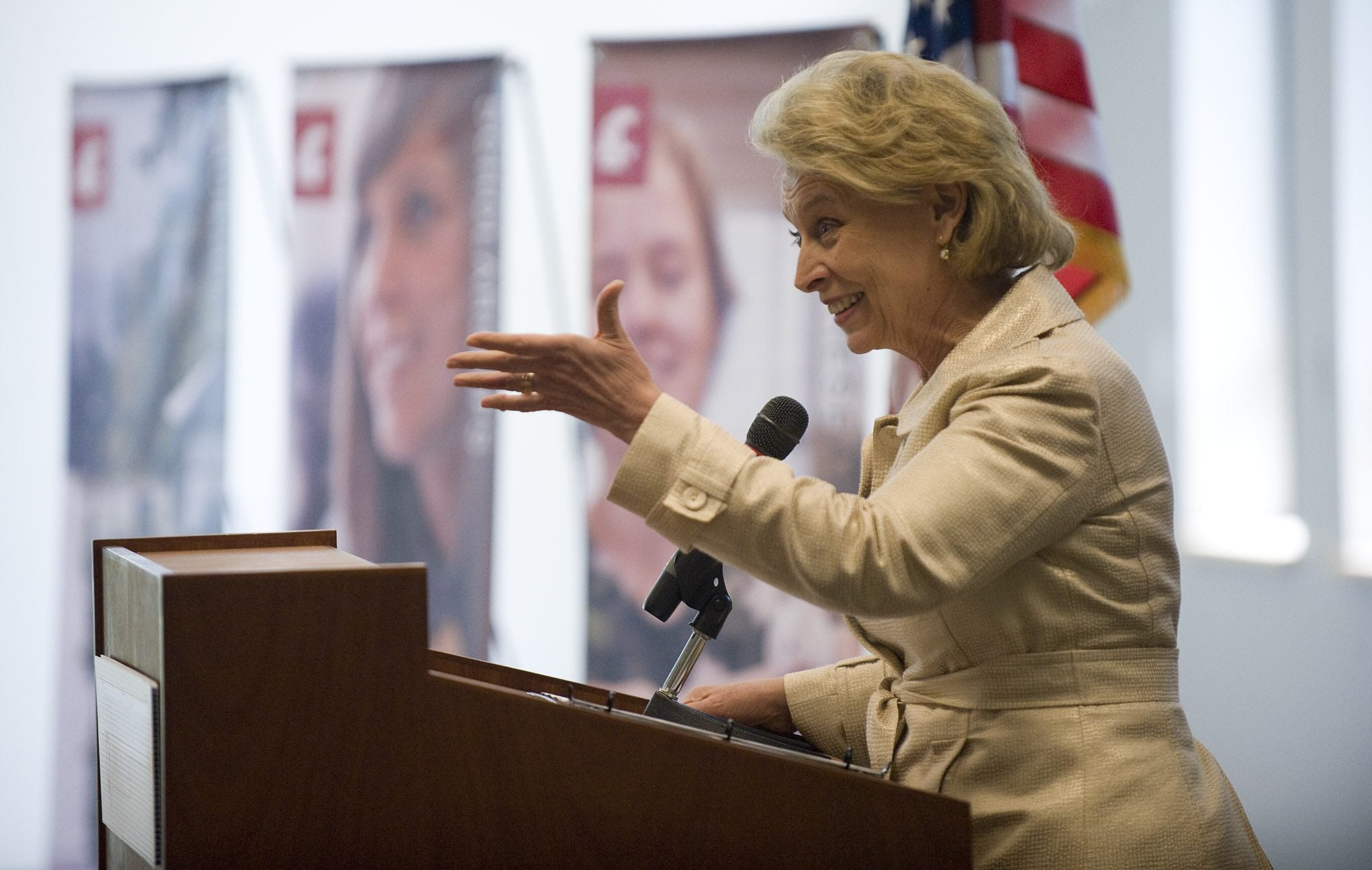Student leaders from Clark County high schools and beyond hoped to ask Gov. Chris Gregoire questions about the loss of education funding during her visit to the Washington State University Vancouver campus on Thursday.
Instead, what they mainly got from the governor was a pep talk on the importance of getting the best education they possibly can, budget cuts or no budget cuts.
Reduced state spending for education was an unfortunate result of the need to bridge a $5 billion budget deficit in the just-concluded legislative session, Gregoire said, “but let it not be an excuse for saying we cannot do better.”
Gregoire had clearly been inspired by her visit the previous day to tiny Bridgeport in rural north-central Washington, where she spoke to a high school graduating class of 37. Most families in the town are farmworkers, most are poor, and many parents don’t speak English.
Yet Bridgeport High placed in the top three nationally this spring in a competition to land President Barack Obama as the school’s commencement speaker. Instead of the President, the students got Secretary of Labor Hilda Solis, who, like most of the students, is of Hispanic background.
Students at the Vancouver event came with plenty of questions.
Kelsey Morrison, a graduating senior at La Center High School, hopes to be a school librarian after college. She’s well aware that experienced teachers are getting laid off and new teachers can’t find jobs. The question she wanted to ask: Will there be a job for her when she graduates from college?
Alyson Pettet, a junior at Vancouver School of Arts and Academics, wondered what will happen to programs at her magnet school if electives are cut to save money. “We’re concerned about the budget,” she said. “Our school is art-based.”
Aubree Helton and Chris Green, who live in Spokane and attend the Washington State School for the Blind, are concerned about cuts at the Vancouver campus, including the layoff of an administrator and the planned elimination of the school’s small preschool program.
“There are different high schools all over the state, but there is only one blind school,” Helton said.
They worry about their own future in an era of cuts in education and social services. Helton hopes to attend Brigham Young University in Utah, major in history, and travel all over the world. “I don’t want my vision (disability) to stop me,” she said.
If budget-writers are cutting staff at the School for the Blind, Green asked, “are they also going to be cutting jobs for disabled people?”
Gabriela Valencia, a sophomore at Lewis and Clark High School, and her boyfriend Mauricio Mercada, who attends the same school, wanted to know if the governor supports the Dream Act. The proposed federal legislation would allow eligible children of undocumented workers to pay in-state tuition at state colleges and universities.
Mercada wants to become an engineer. “My future depends on the Dream Act,” he said. “If I had to pay out-of-state tuition, I couldn’t go to Clark College.”
Under a 2003 state law, undocumented students living in Washington are eligible to pay in-state tuition at state universities and colleges if they have lived in the state for at least three years and have either completed a full senior year of high school and graduated or earned a GED. Students must provide an affidavit stating that they will apply for citizenship when they are eligible to do so
Claire Blaisdell, Trisha Horenstein and Amanda Hamel, all juniors at Hudson’s Bay High School, said they’re going to have to start paying a portion of the cost for college-credit courses they take through the Running Start program. Under the new state budget, students will have to pay 10 percent of the tuition college students pay beginning next fall, and 25 percent the following year. How will that affect them?
All good questions, most of which they didn’t have a chance to ask the governor during the half-hour session.
“You’re asking, ‘What does the future hold for me?’” Gregoire said. As chair of the National Governors’ Association, she said, she has a good feeling for what the world economy needs from the next generation of students. “Two-thirds of the jobs of tomorrow will require something more than high school. … Get as much education as you possibly can and be smart about it.”
She returned then to the students of Bridgeport High.
“They’re all going to graduate, and they’re all going to college,” she said. Many already have earned academic credit through advanced-placement courses introduced by the faculty to boost student achievement.
“The graduation rate used to be 40 percent. Now it’s 100 percent. The community said, ‘We’re not going to accept a 40 percent graduation rate anymore.’ At first, students said they couldn’t pass AP courses, but they are taking and passing AP courses. … That is the kind of thing we need to replicate in this country.”
Later, speaking to a group of tech executives, she said, “The success here is, in my opinion, the American dream. There is no reason we can’t have a first-class education system.”
The governor told The Columbian she believes the cuts the Legislature made in education funding this session will help convince Washington voters that they must invest in quality education if they want their children to compete in the economy of the future and want the state to rebound from the recession.
“They’re going to see it, they’re going to feel it,” she said. “Everyone will see it and feel it. My job is to go out and say, ‘Education can’t afford this level of cuts.’ If they value education, they’re going to have to put money in it, period. They need to ask themselves, ‘Do you want your kids to have a second-rate job?’”
Kathie Durbin: 360-735-4512 or kathie.durbin@columbian.com.



